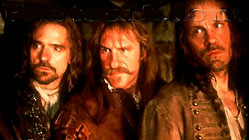|
|
|
|
The
Man in the Iron Mask
|
 |
|
This new version of The Man in the Iron Mask takes a while to get moving. For the first half hour, one observes the leisurely setting-up of the characters. We chuckle at the rather modern banter between ex-Musketeers Aramis (Jeremy Irons), now a priest, and Porthos (Gérard Depardieu), a portly and tired libertine. We regard the brimming anger of Athos (John Malkovich) and the devotion of D'Artagnan (Gabriel Byrne) towards the decadent aristocracy in power. More urgently, our attention is directed to the wicked ways of King Louis (Leonardo DiCaprio), as he trifles with the adorable Christine (Judith Godrèche) and banishes her boyfriend to the fatalities of the front-line. Throughout this entire exposition, we wonder whether debut director Randall Wallace yet has the skill or panache to recapture the epic sweep and drive of Mel Gibson's Braveheart (1995), which he scripted. But once the central intrigue of Alexandre Dumas' classic tale kicks in – the heart-wrenching spectacle of Louis' twin brother Philippe (DiCaprio) cruelly encased within his iron mask, and the efforts of the revitalised Musketeers to change both his destiny and the destiny of France – then this terrific film really takes off. Although this is a handsome and star-studded movie, its ultimate power to affect lies in its air of understatement and modesty. By the end, Randall's decision not to do another Braveheart is fully justified. He is able to swathe these ageing Musketeers – who form a brilliantly acted ensemble – with a completely believable dignity and righteousness. The key images of these men lining up to face battle, or bowing to their King, possess a tender beauty unseen in classical cinema since the era of Hawks and Ford. For decades now, it has been easy for movie audiences to scoff at old-fashioned themes of honour, duty and moral integrity – as if they were merely corny illusions from some distant, naive past. This version of The Man in the Iron Mask, although full of keen humour, eschews any easy recourse to irony, mock exaggeration or a camp sensibility. There is a priceless moment – it would be delivered as a joke in any other contemporary movie – when a solider, gazing upon the last charge of our four Musketeers, murmurs in awe: "Magnificent valour!" The miracle of Wallace's film is that it makes us fully accept this line, and believe in its fine sentiment. MORE Wallace: We Were Soldiers © Adrian Martin March 1998 |
![]()